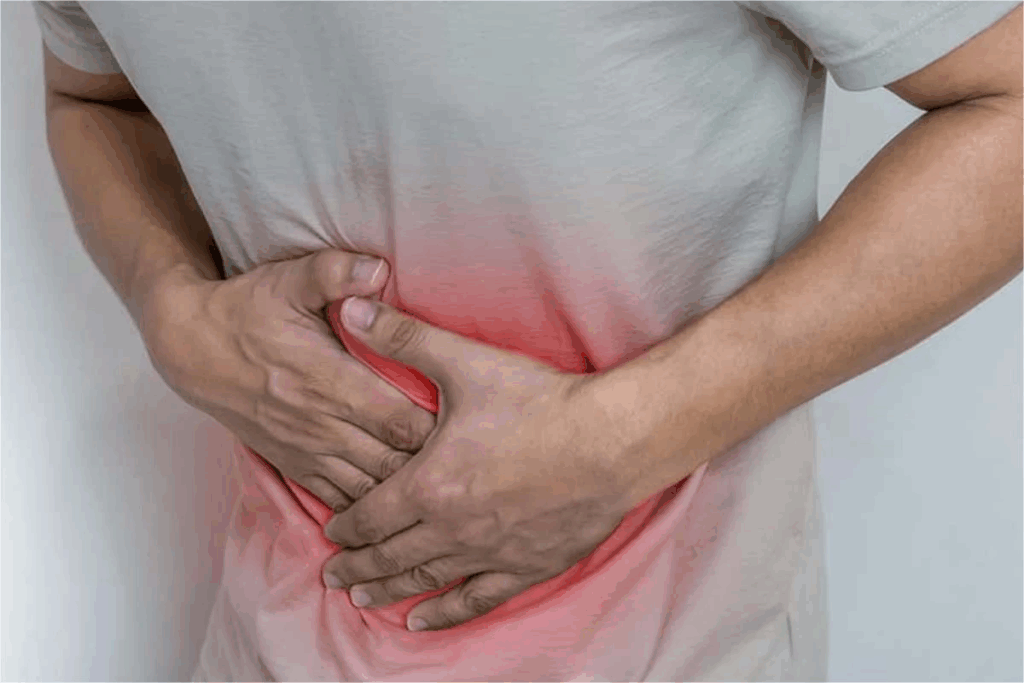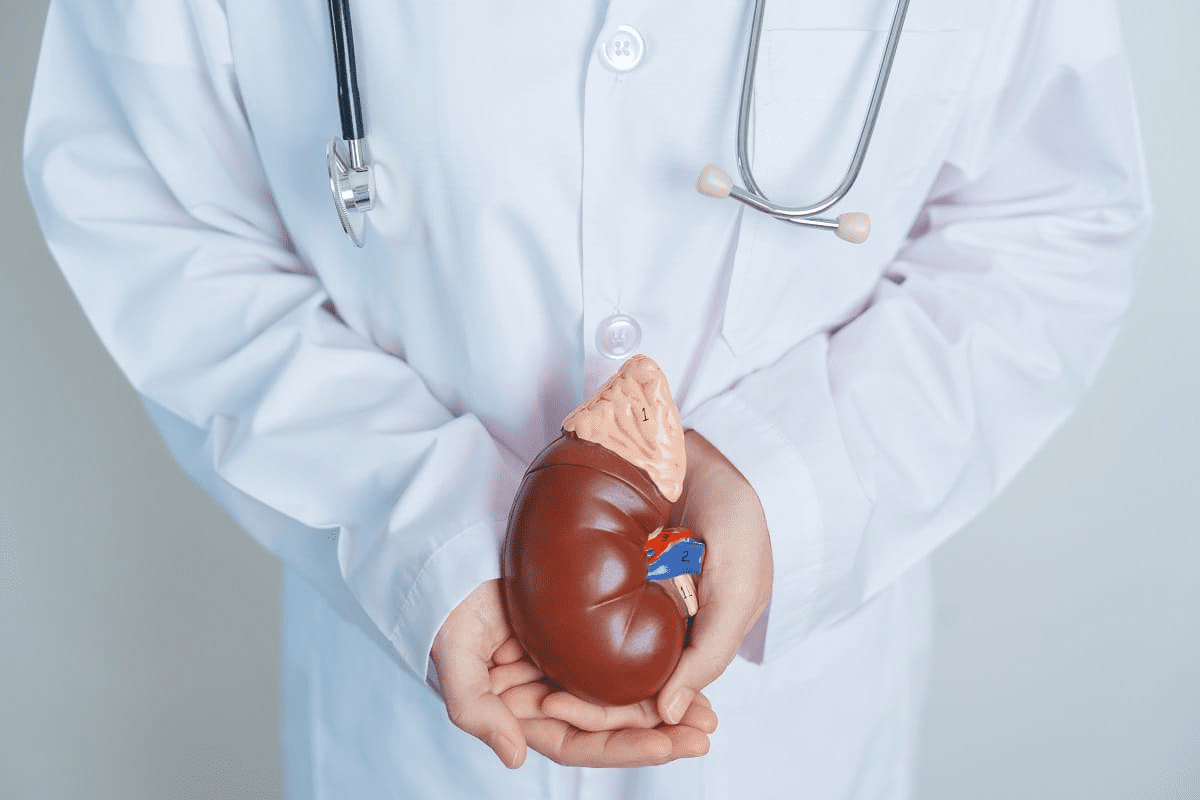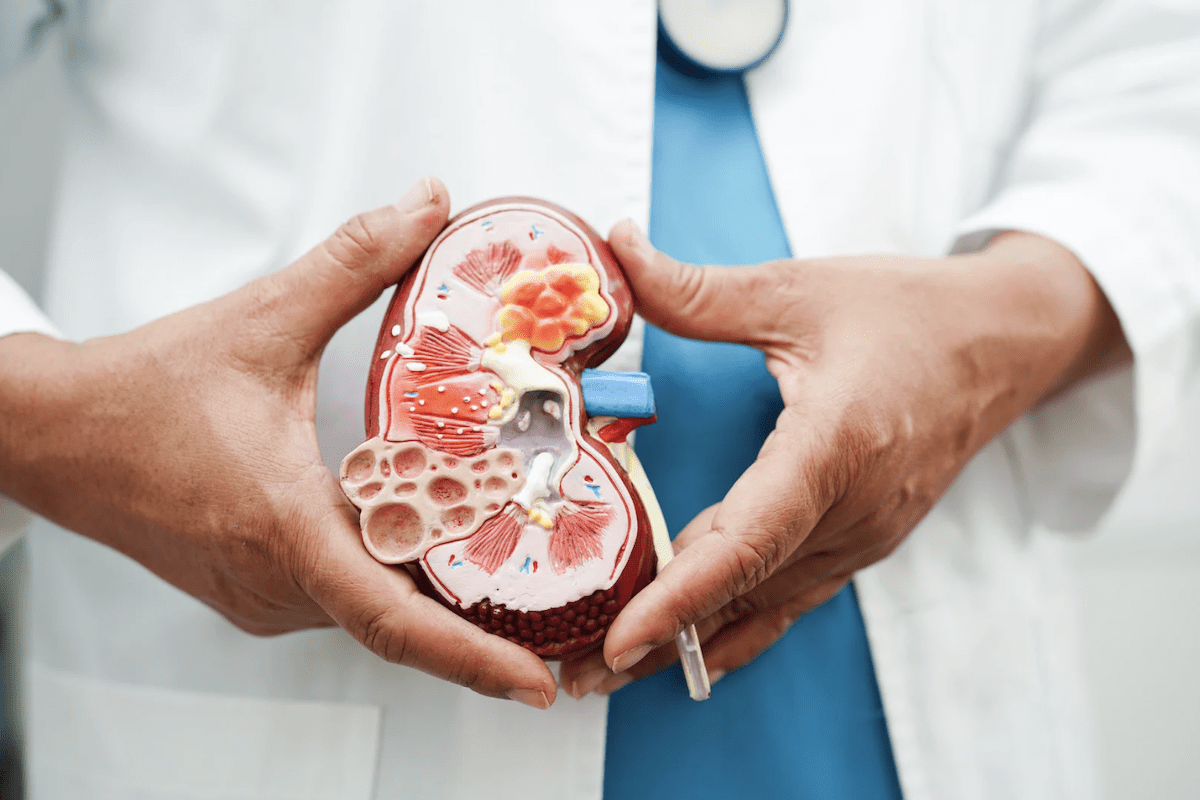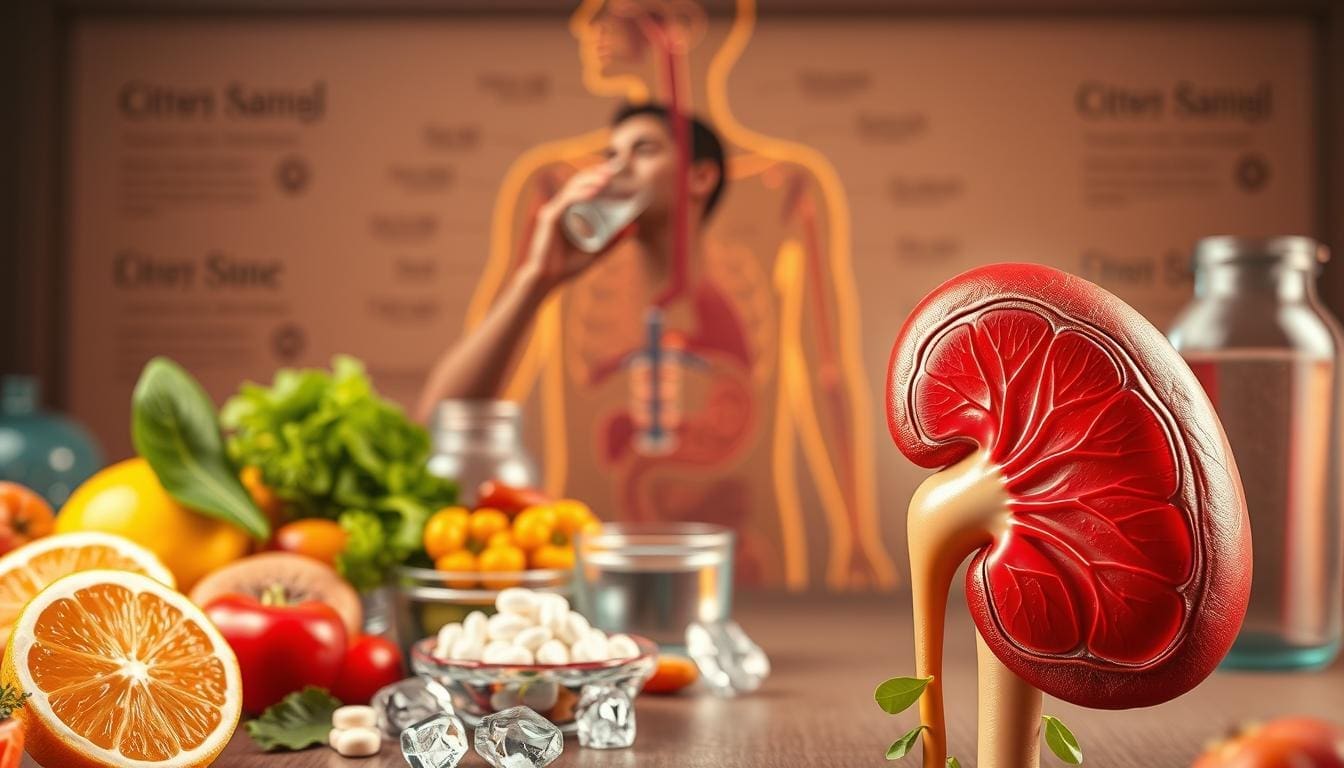Last Updated on November 25, 2025 by Ugurkan Demir

Bladder stones are hard masses of minerals that form in the bladder. They can cause significant discomfort and health issues if left untreated.
What causes bladder stones? Learn the underlying risk factors and discover the key symptoms and signs that indicate you may have one.
Several factors contribute to the formation of bladder stones. These include dehydration, certain medications, and underlying medical conditions. Knowing the causes and recognizing symptoms is key for timely diagnosis and treatment.
Kidney stones are small, hard mineral deposits that form inside the kidneys. They can be extremely painful and are a common health issue affecting many people worldwide.
Kidney stones can be caused by a combination of factors, including dehydration, dietary habits, and genetic predisposition. Understanding these causes is key for prevention and treatment.
Dehydration is a significant risk factor for developing kidney stones. When the body loses too much fluid, the concentration of minerals in the urine increases. This can lead to the formation of stones.
A diet high in animal protein, sodium, and sugar can increase the risk of developing kidney stones. Foods high in oxalate, such as spinach and beets, can also contribute to the formation of certain types of stones.
Genetics play a significant role in the development of kidney stones. Individuals with a family history of kidney stones are more likely to develop them.
Other risk factors for kidney stones include certain medical conditions, such as hyperparathyroidism, and certain medications.
There are several types of kidney stones, including:
Preventing kidney stones involves staying hydrated, maintaining a balanced diet, and managing underlying medical conditions. Treatment options vary depending on the size and location of the stone, as well as the individual’s overall health.
By understanding the causes and risk factors of kidney stones, individuals can take steps to prevent them. This can help reduce their risk of developing this painful condition.
Kidney stones are hard, solid mineral deposits that form inside the kidneys. They happen when there’s an imbalance of water, salts, and other substances. Knowing the causes and risk factors can help prevent and treat them.
Not drinking enough water can make the minerals in urine more concentrated. This increases the risk of stone formation. It’s important to stay hydrated to lower the risk of kidney stones.
A diet high in animal protein, sodium, and sugar can raise the risk of kidney stones. Eating a balanced diet with lots of fruits, vegetables, and whole grains can help lower this risk.
People with a family history of kidney stones are more likely to get them. If there’s a history of kidney stones in your family, it’s key to take preventive steps.
Certain medical conditions, like hyperparathyroidism, can increase the risk of kidney stones. Other conditions, such as kidney disease, can also raise the risk.
Understanding the causes and risk factors of kidney stones helps prevent them. This includes staying hydrated, eating a balanced diet, and managing any underlying medical conditions.
Kidney stones can cause severe pain. This pain is often sharp, cramping, or stabbing. It usually happens in the side or back, below the ribs.
The pain might spread to the lower abdomen or groin. Other symptoms include:
If you notice any of these symptoms, it’s important to see a doctor right away.

Diagnosing kidney stones involves several steps to find the right treatment. We know it can be stressful, but our team is here to help you every step of the way.
The first step is a detailed medical history and physical check-up. Our doctors will ask about your symptoms, health history, and lifestyle. They look for signs that might point to kidney stones.
After confirming the diagnosis, we’ll talk about the best treatment options for you. This might include medical treatments, lifestyle changes, or surgery.
Getting an accurate diagnosis is key to effective treatment. By knowing the type and cause of your stones, we can create a treatment plan just for you. This helps you recover and avoid future problems.

Kidney stone treatment depends on the stone’s size, location, and symptoms. Each patient’s situation is different. We tailor treatment plans to meet specific needs.
There are many ways to treat kidney stones. These range from simple management to more complex surgeries. The right treatment depends on the stone and the patient’s health.
For small stones, we often suggest a conservative approach. This means drinking lots of water to help pass the stone. We also manage pain with medication and check the stone’s progress with tests.
In some cases, we might prescribe medication to help the stone pass. This is called medical expulsion therapy. We also give medications for pain and nausea.
For bigger stones or those causing problems, surgery might be needed. Options include shock wave lithotripsy, ureteroscopy, and percutaneous nephrolithotomy.
Treatment Option | Description | Typical Use Case |
Conservative Management | Monitoring and supportive care to help the stone pass naturally | Small stones with minimal symptoms |
Medical Expulsion Therapy | Medication to help pass the stone and manage symptoms | Stones that are likely to pass but need assistance |
Shock Wave Lithotripsy | Non-invasive procedure using shock waves to break up the stone | Stones that are too large to pass on their own |
Ureteroscopy | Minimally invasive procedure to directly visualize and remove the stone | Stones located in the ureter or those that are difficult to treat with lithotripsy |
Preventing kidney stones is just as important as treating them. We advise on diet, fluid intake, and lifestyle changes to lower the risk of new stones.
In conclusion, treating kidney stones involves many options. From simple management to surgery, we tailor care to each patient’s needs. Understanding each case helps us provide the best care.

Making lifestyle changes can greatly lower the risk of kidney stones. Prevention is key, and healthy habits can help avoid the pain of kidney stones.
Staying hydrated is a top way to prevent kidney stones. Drinking lots of water dilutes urine, making it less likely for minerals to form stones. Aim for at least eight glasses of water a day, more if it’s hot or you’re active.
Dietary adjustments are also important. Eating less sodium can help, as high sodium levels can increase calcium in urine. Limit foods high in sodium and oxalate, like processed meats and some leafy greens.
Regular physical activity is another key to prevention. Exercise boosts health and lowers stone risk. But, remember to drink enough water to avoid dehydration.
Managing weight and reducing stress are also important. Being at a healthy weight and managing stress can lower stone risk. Stress management, like meditation or yoga, can help your body.
By making these lifestyle changes, you can greatly reduce your risk of kidney stones. Always talk to a healthcare professional to find the best prevention plan for you.
Making a few simple changes can lower your risk of kidney stones. Drinking plenty of water is key to staying hydrated and helping your kidneys work right. Try to drink at least eight glasses of water a day.
Eating a balanced diet is also important. Eat lots of fruits, vegetables, and whole grains. Cut down on animal protein, foods high in oxalate, and sodium.
Regular exercise is good for your health and can help prevent kidney stones. Aim for 30 minutes of moderate exercise each day.
By making these lifestyle changes, you can lower your risk of kidney stones and stay healthy.
Preventing kidney stones requires making changes to your diet. Drinking plenty of water is key. It helps dilute your urine and lowers the risk of stone formation.
Eating a balanced diet is also important. Focus on fruits, vegetables, and whole grains. These foods are good for you and can help prevent stones.
It’s also important to watch your sodium intake. Too much sodium can increase your risk of getting stones. And, be careful with animal proteins. They can also raise your risk.
By understanding how diet affects kidney stones, you can make better choices. This can help lower your risk of getting them.
Kidney stones can cause serious problems if not treated quickly. We will look at these issues and answer some common questions about kidney stones.
One big worry with kidney stones is obstruction of the urinary tract. A stone blocking urine flow can cause a lot of pain and more problems.
If you have symptoms of kidney stones, see a doctor right away. It’s important to get a proper diagnosis and treatment from a healthcare professional.
Some common questions about kidney stones include:
Understanding the complications of kidney stones and answering common questions helps us manage and prevent this condition better.
Knowing about kidney health is key to avoiding and handling issues like kidney stones.Kidney stonesare hard deposits made of minerals and salts that form inside the kidneys. They can cause severe pain, nausea, and vomiting. The risk factors include dehydration, diet, and genetic predisposition.
Treatment varies from pain management to surgical intervention, depending on the stone’s size and location. By being aware of the symptoms and taking preventive measures, individuals can reduce their risk of developing kidney stones.
Kidney stones are a complex condition. They are influenced by genetics, environment, and lifestyle. Knowing the causes and risk factors is key to preventing and treating them.
The formation of kidney stones is often due to mineral concentration in urine. When urine is concentrated, minerals can crystallize and form stones. Factors like dehydration, diet, and genetics play a role in this process.
Some risk factors increase your chance of getting kidney stones. These include a family history, being overweight, and certain medical conditions. Taking specific medications can also be a risk.
Lifestyle and environmental factors also matter. A diet rich in animal protein, sodium, and sugar can raise your risk. Not drinking enough water is another major risk factor.
Risk Factor | Description |
Family History | Having a family history of kidney stones increases your risk. |
Dehydration | Inadequate fluid intake can concentrate minerals in the urine. |
Diet | A diet high in animal protein, sodium, and sugar can increase risk. |
Medical Conditions | Conditions like gout, urinary tract infections, and certain metabolic disorders. |
In conclusion, kidney stones come from genetics, environment, and lifestyle. Understanding these factors helps in preventing and managing the condition.
Knowing the symptoms of kidney stones is key to getting help quickly. These stones can cause a variety of symptoms, each with its own level of pain.
The most common symptom is severe pain. People often say it’s one of the worst pains they’ve felt. This pain usually starts in the back or side and can spread to the lower abdomen or groin.
Other symptoms include nausea and vomiting. These happen because the body reacts to the stone and the pain it causes.
“The pain from a kidney stone can be excruciating and is often accompanied by other symptoms such as nausea and vomiting.”
Other symptoms of kidney stones include:
If you have any of these symptoms, see a doctor right away. Early treatment can make you feel better and prevent bigger problems.
We know kidney stone symptoms can be scary. Our medical team is here to help. We offer full care and support to manage your condition well.
To figure out if you have kidney stones, we take a detailed approach. We look at your medical history, do a physical check, and use imaging tests. This helps us find out if you have kidney stones.
When you come to see us, we start by asking about your health history. We want to know if you’ve had kidney stones before. We also do a physical check to see if you have pain in your flank or lower belly.
Imaging tests are key in finding kidney stones. Here are the main ones we use:
We might also do urine tests to see if there’s an infection or other issues.
Getting the right diagnosis is important for treatment. By looking at your medical history, doing a physical check, and using imaging tests, we can find kidney stones accurately. This way, we can give you the best care.
Kidney stone treatment can vary a lot. It depends on the stone’s size, location, and type. Also, the patient’s health is important in choosing the best treatment.
Pain Management is key in treating kidney stones. We use different medicines to help with pain. These range from simple over-the-counter drugs to stronger prescription ones. Sometimes, a hospital stay is needed to manage pain and symptoms well.
For small stones, conservative management is often the first step. This means drinking lots of water to help pass the stone. We also manage pain and keep an eye on the stone’s progress. Regular check-ups with a healthcare provider are important to avoid any problems.
If small stone treatments don’t work, surgical intervention might be needed. There are several surgical options:
The right surgery depends on the stone’s size, location, and type. It also depends on the patient’s health and what they prefer. We talk to patients to find the best treatment plan. We make sure they know all about their options and the possible risks and benefits.
To prevent kidney stones, you need to focus on hydration, diet, and managing health conditions. We’ll dive into these areas to help you lower your risk of getting kidney stones.
Hydration is key in preventing kidney stones. Drinking plenty of water helps dilute your urine. This makes it harder for minerals to form stones. Aim for at least eight glasses of water a day, more if you’re active or live in a warm place.
Making changes to your diet is also important. Some foods can raise your risk, while others can lower it. For instance, eating a lot of animal protein can increase your risk. But, eating more fruits and veggies can help.
Managing medical conditions is also vital for preventing kidney stones. Certain conditions, like hyperparathyroidism and urinary tract infections, can raise your risk. Working with your doctor to manage these can help lower your risk.
A leading urologist says, “Prevention is key for kidney stones. By knowing your risk factors and making lifestyle changes, you can greatly reduce your chance of getting stones.”
“The most effective way to prevent kidney stones is to understand your individual risk factors and develop a personalized prevention plan.”
In summary, preventing kidney stones requires a mix of staying hydrated, adjusting your diet, and managing health conditions. By following these steps, you can greatly reduce your risk of getting kidney stones.
Making lifestyle changes can help prevent kidney stones. Drinking plenty of water is key. It dilutes urine and lowers mineral concentration that can cause stones.
Staying hydrated is just the start. Eating a balanced diet low in sodium and animal protein is also important. Foods high in calcium, like dairy, can help prevent stones.
Regular exercise is another must. It boosts health and lowers risks of obesity and high blood pressure. These conditions can increase kidney stone risk.
By making these changes, you can lower your risk of kidney stones. It also improves your overall health.
To prevent kidney stones, it’s key to eat well and live healthily. Drinking lots of water is vital. It helps to dilute your urine, lowering the chance of stones forming.
Eating a variety of fruits and vegetables is good. They provide important nutrients. Also, cut down on animal protein and sodium to help prevent stones.
By tweaking your diet and lifestyle a bit, you can lower your risk of kidney stones a lot.
Kidney stones can lead to serious issues like infections and kidney damage. If not treated, they can cause severe pain. This pain can also lead to chronic kidney disease.
It’s important to seek medical help quickly. This can help ease symptoms and prevent further damage.
Many people wonder about kidney stones. They ask about what causes them and how they’re treated. We’ll answer some common questions to help you understand better.
One question is, “What are kidney stones?” Kidney stones are hard deposits made of minerals and salts that form inside the kidneys. They can be painful and sometimes need medical help.
Another question is, “What causes kidney stones?” Causes include dehydration, certain diets, and genetics.
Here’s a summary of common questions and their answers in a tabular format:
Question | Answer |
What are the symptoms of kidney stones? | Severe pain in the back or side, nausea, vomiting, and possibly blood in the urine. |
How are kidney stones diagnosed? | Through imaging tests like CT scans or ultrasounds, and sometimes urine analysis. |
What are the treatment options for kidney stones? | Treatment varies depending on the size and location of the stone, ranging from pain management to surgical removal. |
Knowing the causes and risk factors can help prevent kidney stones. Diet, hydration, and family history play a role.
For those who’ve had kidney stones, preventing them is important. This means changing your diet and staying hydrated.
We hope these FAQs about kidney stones have been helpful. If you have more questions or concerns, always talk to a healthcare professional.
Different groups of people face unique challenges when it comes to kidney stones. This is due to a mix of factors like genetics, diet, and lifestyle. Some groups are more likely to get kidney stones because of their genes, what they eat, and how they live.
Genetic Predisposition: Some people are more likely to get kidney stones because of their genes. For example, Caucasians are more likely to get calcium stones than others.
Environmental Factors: The climate, how much water we drink, and our diet also play big roles. People living in hot, dry places are more likely to get dehydrated. This makes them more at risk for kidney stones.
Socioeconomic status also matters. People with more money might eat differently and have better access to healthcare. This can change how likely they are to get kidney stones.
Dietary Influences: What we eat is very important when it comes to kidney stones. Eating a lot of oxalate, sodium, and animal protein can increase the risk.
“Changing what we eat can greatly lower the chance of getting kidney stones again,” says recent clinical guidelines.
Knowing these factors helps us make better prevention and treatment plans for different groups. This makes our efforts more effective.
Staying informed and taking proactive steps can help manage your kidney health. This reduces the risk of kidney stones. For more information and personalized guidance, please consult with a healthcare professional.
Dehydration, diet, and genetics play big roles in the formation of kidney stones. Understanding these factors can help prevent them from recurring.
Yes, kidney stones can often be prevented through lifestyle changes. Drinking plenty of water, maintaining a healthy diet, and managing underlying health issues can help.
“The key to preventing kidney stones lies in understanding their causes and making informed lifestyle choices.”
Common symptoms include sharp pain in the back or side, nausea, vomiting, and fever. Recognizing these signs early can help you receive the right treatment quickly.
Doctors use imaging tests such as CT scans and ultrasounds, along with blood and urine tests, to locate stones and check for related complications.
Treatment depends on the stone’s size and location. Options range from pain medications and increased hydration to more invasive procedures like surgery if necessary.
Yes, dietary changes can help prevent stones. Reduce sodium intake, ensure adequate calcium intake, and avoid foods that increase stone risk.
National Center for Biotechnology Information – Causes of Bladder Stones https://www.ncbi.nlm.nih.gov/books/NBK441944/
Subscribe to our e-newsletter to stay informed about the latest innovations in the world of health and exclusive offers!